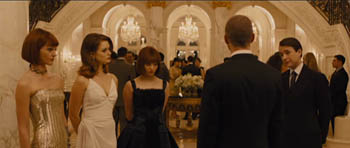|
Half of the cast of Alpha Dog reunites for writer-director Andrew Niccol's latest sci-fi venture, where the phrase "time is money" takes on a frighteningly literal meaning. I can easily imagine this aphorism being the germ of the idea in its infancy, the spark that gave Niccol his latest inspiration. When all is said and done, it seems that perhaps he could've used a few additional sparks. 
People misuse the word "literally" all the damn time, but here, it's quite apt: in the world of the film, time literally is money. You use it to pay your bills, it can be transferred from one account to another, it can be loaned, and prices are constantly on the rise. People will mug you for it. It's the new currency. Due to medical advances, aging has been frozen at age 25, but the catch is that you get only one "free" year beyond that. Any extra time on your human clock (seen constantly ticking down on your forearm like an embedded digital readout) must be paid for. The average citizen is typically found with just a day or two on his or her clock at any given time. "Living day to day" is another turn of phrase that becomes disturbingly immediate: if your clock hits zero, you die instantly. Will Salas is one of the teeming masses of the less fortunate, doomed to seeing his clock always nerve-rackingly close to punching his card for good, when he encounters a century-old man with another unused century to go. The man, who has grown weary of life, tells Will that the social engineering that has created his particular brand of poverty was orchestrated on purpose, as a world filled with immortals would quickly have a miserable overpopulation problem. This, of course, hasn't stopped the well-to-do from indulging in virtually limitless lives while most of the world's populace lives forever on the brink of death. Will decides this horribly lopsided disparity needs rectifying, and that he's the man to see it done. He eventually falls in with the lovely Sylvia Weis, a spoiled heiress who's never known life outside of her "time zone" and who must take a hard look at what her father's lending empire has wrought. 
It's easy to see Niccol's fascination with the subject, as his earlier sci-fi drama Gattaca mined much the same territory: a medical advancement intended to improve life ends up creating a highly divided class society. (His apparent fascination with nighttime skinny-dipping is presumably unrelated, though his choice to show us more of Ethan Hawke's ass in Gattaca than he shows us of Amanda Seyfried's here is inexplicable to anyone who isn't a woman.) Gattaca was part futurist speculation and part detective story, an interesting mix that served it well. Here, he's presented an action film full of young and beautiful people, wedded to a sci-fi premise with obvious social and political implications. This is exactly the sort of entertainment I enjoy, but for the uneven weighting. In many ways, it serves its cops-and-robbers aspects more fully than its more cerebral ones. Many have criticized the fact that the film gives no explanation of how exactly one transfers time via a handshake, or how this altered biology is meant to function. This is not the problem. Any explanation would be nothing but the sort of made-up science that does nothing but waste screen time. The problem is that the basic idea is so arch, so bluntly allegorical, that it runs close to having nearly no idea at all. Once one has made the simple equation of time=money, there's very little new to see here, beyond the stark immediacy of death; running out of cash is bad, but it's not an instant death sentence. Allegories are best when they're sneaky, when they can fly at least slightly unnoticed below the radar and get people to question ideas they may not have fully examined. The character of Robin Hood has enjoyed sustained popularity despite the fact that a modern-day equivalant could be easily dismissed by many as Socialist or Communist, ignoring the basic point: it's not privilige that is evil, but rather privilige attained at the expense of the already underpriviliged. 
Rampant recent dissatisfaction around the world with the status quo has led to mass protest, revolution, and the toppling of multiple governments, making a film like this exceedingly timely, no pun intended. It's unfortunate, then, that In Time doesn't spend more of its own time exploring the depths of its premise. Consider Cillian Murphy's policeman-in-pursuit. The cops of this culture, called Timekeepers, don't seem to be particularly well-paid. They live on a short leash and don't enjoy much luxury, yet they defend the very laws and upper classes that keep them from advancing. I'd have liked to know more about their reasons, but we learn lamentably little about them, as the script spends more time with the more likeable Will and Sylvia instead of the antagonistic but more interesting detective. Ultimately, the biggest issue is that revolt here seems entirely too easy; more than once I found myself wondering "So why had nobody thought to do that before?" The film closes with a shot clearly meant to evoke bravado, heroism, triumph. To me, it looked more like attempted suicide. "Two against the world" may sound very romantic, but it's not very practical. In Time misses what the last great futurist revolution rabble-rouser V for Vendetta got right: while one man can ignite a sweeping change, if his idea is not adopted and propagated throughout the culture, it's an idea that's dead on its feet. -review by Matt Murray
|
|
||||||||